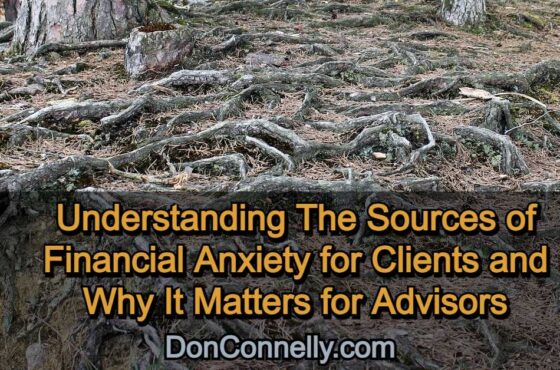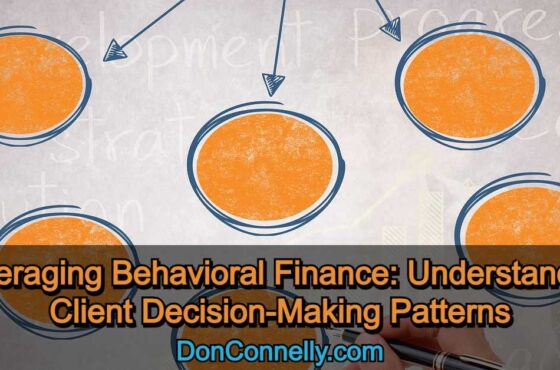Clients not Giving You Referrals? Here’s Why That May Be
 We devote a lot of space here on how to generate referrals, and with good reason. Generating quality referrals is critical to building a sustainable and profitable practice. Many of our articles address the ‘how,’ even addressing how to overcome the reluctance to ask for referrals. Based on my decades of experience, I’m confident that advisors who study those articles and incorporate the tips and practices into their process can generate more referrals.
We devote a lot of space here on how to generate referrals, and with good reason. Generating quality referrals is critical to building a sustainable and profitable practice. Many of our articles address the ‘how,’ even addressing how to overcome the reluctance to ask for referrals. Based on my decades of experience, I’m confident that advisors who study those articles and incorporate the tips and practices into their process can generate more referrals.
But what if clients are still not giving you referrals?
You may feel you are doing the right things, but if you’re asking and clients are not giving, you may need to consider the possibility that you are the problem. Maybe it’s not what you’re doing or not doing, but rather it’s the vibe you give off.
It’s important to understand that even if your clients are happy with you and your service, they may still not perceive you as referable. They may see you as competent and are comfortable with their relationship with you, but for some reason, they don’t feel comfortable sending friends and colleagues to you.
To get to that reason, you should take inventory of your people skills, including your mannerisms, how you interact with people, how people respond to you, and generally how you come across to people. Ask a colleague or close friend for their brutal honesty in helping you with your appraisal.
There could be any number of ways advisors may be impairing their referability. Here are three we see most often:
#1. Talking past people
You’ve invested a great deal into developing the knowledge and skills to become a competent financial advisor. So, you may feel the need to demonstrate your expertise with highbrow explanations and sophisticated charts. Your clients may appreciate your knowledge, but if they don’t clearly understand what you’re telling them, they probably don’t want to expose anyone else to it.
Referable advisors make a point of stowing the jargon and instead focusing on ways to connect with their clients on a personal level, doing less talking and more listening. Clients really don’t care about how much you know until they know how much you care about them.
#2. Failure to build a deeper personal connection
We have written extensively on the importance of building a personal connection with prospects to earn their trust. It’s even more important to reinforce that personal connection once they become a client. Yet, some advisors take their client relationships for granted and neglect their client’s need to know you care about them personally.
Referable advisors make it a priority to engage with their clients on a personal level, checking in regularly on their families and career and offering assistance outside the financial realm. The best way to show you care is to be there when life events—good and bad—unfold, offering to help guide your clients through them. Don’t ask if there’s anything you can do; just do it.
#3. Ignoring the spouse
It’s common for advisors to direct their attention to the husband because they tend to be more involved in financial discussions. However, it may surprise you to know that many wives take control of financial conversations at home and are willing to exercise their veto power over critical decisions, including whether to refer other people to you.
In all your client interactions, it’s critical to connect with both spouses, making them feel equal in the relationship.
Want to get to the real reason why clients are not giving you referrals? Ask them!
Advisors should be aware that every interaction with their clients is an opportunity for them to reevaluate their relationship—essentially asking themselves, “Was this the right decision to choose this advisor, or did I make a mistake?”
Marketers invest heavily in understanding why people decide to purchase a product and why they are so loyal to a particular brand. The most valuable information they use in their research is the post-purchase evaluation or customer feedback, which they can obtain through surveys or studying online reviews. Retailers and other companies spend millions of dollars for that information because they can use it to improve their offerings to meet or exceed customer expectations.
Achieving the same level of understanding of their client’s decision-making should be the number one task of financial advisors striving to improve their client experience and grow their practice. To that end, advisors must create a post-purchase or interaction engagement process that taps into their clients’ thoughts and feelings about their relationship.
Conduct a post-interaction survey
Having your clients respond to a post-interaction survey is an excellent way to get valuable feedback and increase engagement. You can survey your clients on how they view you, your services, and what they want to see changed. Your clients will appreciate that you value their feedback and opinions.
The surveys should be brief—no more than five or six questions, as in the following example:
- Our firm exceeds expectations.
Yes/No
- We regularly provide information of value to you.
Yes/No
- We make it easy for you to do business with us.
Yes/No
- Our people often go above and beyond to serve you well.
Yes/No
Anyone in particular? ______________________________________________________
- We sincerely try to answer all your questions.
Yes/No
- Our team has a good understanding of your needs.
Yes/No
Please elaborate on any “no” answers: ________________________________________ _______________________________________________________________________
- Is there anything about our relationship you would like to see changed or improved?
_______________________________________________________________________
_______________________________________________________________________
Using an online service like Survey Monkey, you can easily create surveys and include a link to the survey in an email or on your website.
The true value of asking for feedback is it creates a sense of partnership and commitment to the relationship. When you ask clients for feedback, they are reminded of everything you do for them and that you care. That makes you a much more referrable advisor.
Watch this 2-minute video to learn how our 8-step training program will help you create your unique value proposition and develop a plan for using it day in and day out for the rest of your career to attract new clients.
See program details and enroll today!
Available as a self-paced program or in combination with an individual coaching session with Don Connelly, this program will help you reboot your practice and take it to new heights. Select your format and enroll now!



